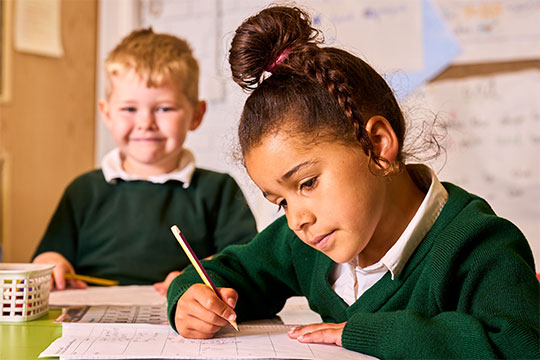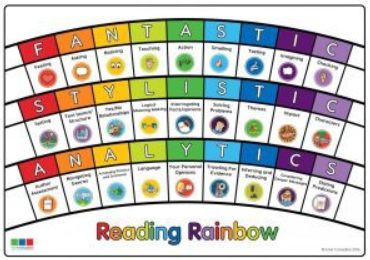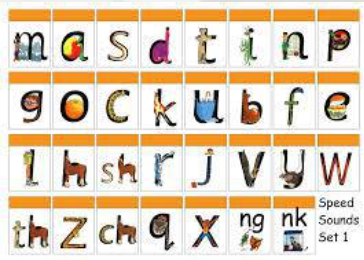
"I love coming to this school because students and staff are so friendly"
"I like coming to this school because I'm challenged in my learning"
Upcoming School events
Children finish School for Half Term
Children finish School for Half Term
English
Go to Reading
Go to Phonics
Go to Writing
Reading
Reading Intention:
At Bozeat primary School cultivating a love of reading is actively encouraged throughout the school from Preschool through to Year 6. Great emphasis is placed on developing pupil’s skills in reading from Reception, so that they can explore and discuss challenging texts confidently during our daily reading sessions. Shared, modelled and independent reading has a specific focus and is a fundamental part of a child’s reading journey. Teachers use a range of rich texts linked to the Pie Corbett Reading Spine, so that pupils use of vocabulary and enjoyment of reading is heightened.
We actively promote and celebrate our love of reading through our school environment, focussed whole school assemblies, book fairs, author visits, Book & Biscuit sessions with parents, reading buddies and celebration days such as World Book Day.
Reading Implementation:
We teach reading through two strands: word recognition (phonics) and language comprehension (understanding the words they read).
At Bozeat Primary School we teach phonics using the Read Write Inc programme to ensure the progressive development of skills so that pupils can decode effectively whilst also learning to spell well. They learn how to read the sounds in words and how those sounds can be written down, we teach the children simple ways of remembering these sounds and letters.
Across Reception and KS1, children have a daily phonics lesson which is taught in small, fluid groups based on frequent assessment so that they are reactive to the changing needs of learners. Pupils in Preschool will be introduced to phonics during the Summer Term when they will begin to learn the mnemonic pictures for the first sounds in preparation for starting Reception. Our phonics lessons are taught by our expert phonics teachers who have been trained to deliver carefully structured lessons that are consistently applied across the Early Years and KS1.
Pupils will begin to bring home phonetically decodable books in Reception and throughout KS1 that are carefully matched to each child’s ability, these are taught and used during phonics lessons and then sent home to embed the key skills being taught in school. In KS1 pupils will also have a second book that is not used in phonics lessons, but that will still be carefully matched to their reading ability.
At the end of Year 1, pupils will sit a national phonics test known as the Phonics Screening Check (PSC). During the test, pupils are asked to decode and read 40 words. We report their score to you at the end of the year, usually there is a pass mark of around 32. More information about the PSC can be found here ………..(link to https://home.oxfordowl.co.uk/year-1-phonics-screening-check/ )
At Bozeat Primary School, from Year 1 through to Year 6, we teach language comprehension using a systematic approach called ‘Hooked on Books.’ This provides the pupils with a set of tools and structures that can be applied to their reading in all contexts. Pupils will partake in a 3/4x a week 30 minute ‘Book Talk’ session and will once a week work intensively with the teacher for an inference session. The Hooked-on Books approach is underpinned by these key aspects as outlined below:
- Book Talk – a whole class comprehension and targeted group approach.
- The Reading Rainbow – sessions are themed around open ended questions to tackle the three layers of the Reading Rainbow, to target reading competencies and develop understanding.

- Demonstration Reading – sessions demonstrate how a reader thinks during the process of reading for meaning.
- Demonstration Comprehension – clear, out loud thinking by the teacher, modelling answers to questions.
- Children are encouraged to use reading sentence stems to help structure their answers; the reason I think this is because… The evidence to support my opinion is ……….
- Independent Comprehension – pupils apply what they have learnt in demonstration comprehension to their independent work. They will know how to use critical language to express themselves and use appropriate book-based language.
Reading Impact:
Nothing is more important in education than ensuring every child can read and read well. We are committed to ensure that every child at our school is a reader. Our children will understand the importance of reading and consistently strive to gain high outcomes. By the time they reach Year 6, they will have experienced a rich variety of literature, moving from learning to read to reading to learn. They will be exposed to a wide range of vocabulary, using this to engage in meaningful discussions about books. At Bozeat Primary School our children are motivated and inspired by a love of reading.
Phonics
At Bozeat Primary School we follow the Read Write Inc (RWI) Phonics scheme which has been validated as a complete Systematic Synthetic Phonics programme by the DFE. It is designed to create fluent readers, confident speakers, and willing writers. Synthetic phonics is the ability to convert a letter or letter group into sounds that are then blended together in a word.

We begin the programme in Nursery, during the summer term, and will continue teaching RWI to children beyond the age of 7 if they still need support in their reading.
Take a look at the videos and documents below to learn more about RWI and phonics:
• What is Read Write Inc? – click here
• Ruth Miskin Parents’ Page – click here
• Oxford Owl free eBook Library – click here
Pre-School
During the summer term before your child starts Reception in September, they will be introduced to the initial sounds in short five-minute sessions.
Reception
The children will learn how to read the sounds in words and how those sounds are written. They will learn 44 sounds and the corresponding letters using simple picture prompts. They will learn to read using Fred talk and simple blending. The children will then read a range of storybooks and non-fiction books that are closely matched to their phonics knowledge. They will also develop comprehension skills by answering discussion questions.

The children will learn to write the letters which represent the 44 sounds and learn to write words by using Fred talk. When writing, the children will build sentences by practising sentences out loud before they write.
Key Stage One
The children will follow the same format as in Reception but will work on more complex sounds and read books appropriate to their reading level. We aim for children to become fluent speedy readers by the time they leave Year 2.
To help all children become speedy readers, all the RWI books children will read contain red and green words. Red words are not easily decodable and contain the high frequency or ‘tricky’ words that hold and link sentences together. Green words are linked to the sounds they have been learning and are easily decodable.

Nonsense Words / Alien Words
As well as learning to read real words, children will also read nonsense words. These are designed to give children the opportunity to apply their phonics skills. These words will feature in the Year One Phonics Screening check.
Year One Phonics Screening Check
Children will complete a word reading check at the end of Year 1 to confirm whether they have learnt phonic decoding to an appropriate level. Children will read 40 words during a short assessment. If they do not manage to read 32 of the words, they are given extra support and will repeat the check at the end of Year 2.
In our school, we aim to make sure that every child learns to read accurately so they are set up for success in school and in life.
As soon as we spot a child who needs extra practice learning to read sounds and words, we teach them one-to-one for a few minutes every day. The emphasis is on ‘keep up’ not ‘catch up.’
If you have any questions about RWI please see your class teacher or Miss Pettit our reading leader.
Writing
Writing Intention:
At Bozeat Primary School we intend for our pupils to be independent, resilient and confident writers who are ready to embark on the next stage in their education. We aspire to spark their imagination, ensuring that children are enthusiastic and motivated to write. We want every child to believe that they are a writer. The highest standards of spoken and written language are consistently modelled and used in our school. We believe that it is vital that children are able to communicate effectively through speaking, listening and writing. Being able to write well supports learning in the wider curriculum; we intend for our children to use their skills across the curriculum consistently.
Writing Implementation:
We use the Talk for Writing approach to teach literacy throughout the school. The teacher uses stimulating experiences (hooks) at the start of a unit to inspire the children, encouraging them to feel enthusiastic about their learning. A unit begins with teachers assessing what children can already do using ‘cold writes’. The children then orally rehearse and internalise model texts, so that they understand the patterns, structure and vocabulary required for the intended genre. Effective shared writing practice is a fundamental part of the writing process. Grammar and spellings are taught in context and discretely, where applicable. This develops into independent application of acquired skills through innovation. At Bozeat, we underpin our writing curriculum work with an established reading spine of quality fiction, poetry and non-fiction that all children experience and draw upon. The writing curriculum is coherently sequenced so that knowledge and skills are revisited and built upon. This is developed across four strands: the composition of writing through ambitious models, grammatical subject knowledge, vocabulary development and awareness of authorial intent.
Our whole school progressive writing overview ensures that there are ample opportunities for all children to apply their core writing skills across the wider curriculum.
Our ‘washing line’ displays demonstrate high-quality writing and support children’s independent application of skills taught. In every classroom the learning journey and compositional/grammatical focus is clearly visible.
At Bozeat, we promote a love of writing in many ways. We use displays to showcase excellent pieces of work on a cyclical basis – each year group contributes wonderful writing to designated displays. ‘Star Writers’ are celebrated twice termly and acknowledged in whole school celebration assemblies and in our weekly newsletter. Pens and licences are awarded when children have mastered our handwriting scheme and these are also presented in celebration assemblies.
Writing Impact:
Bozeat children believe that they are writers. They are given many opportunities to showcase their writing skills in literacy and across the curriculum. Our children’s love of reading and writing go hand in hand.”
